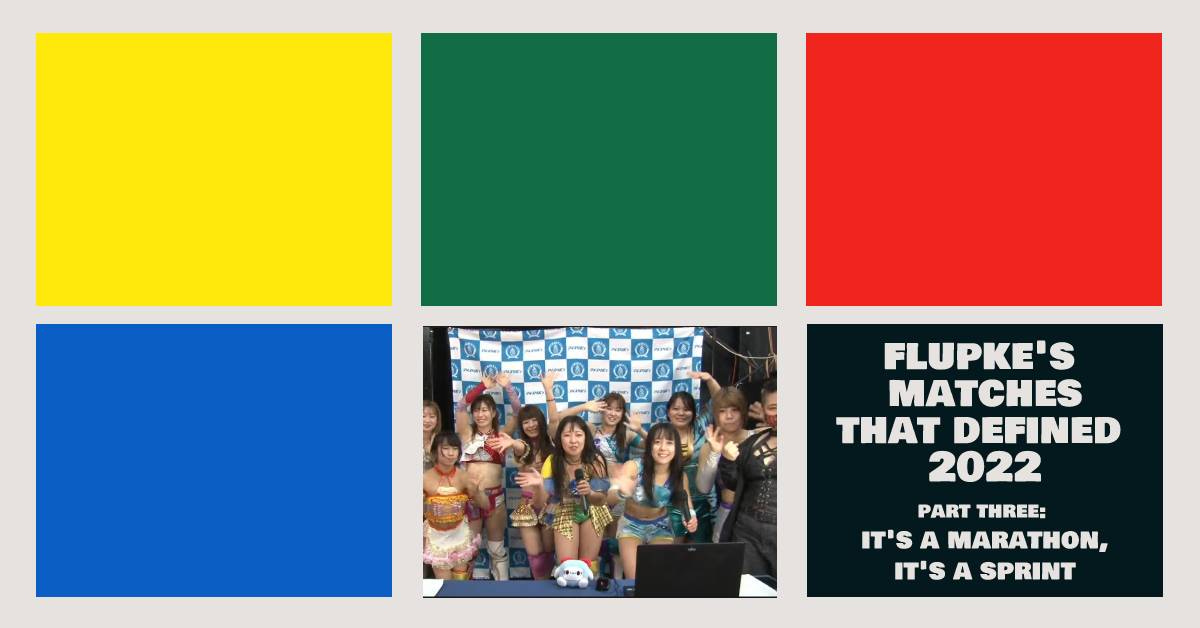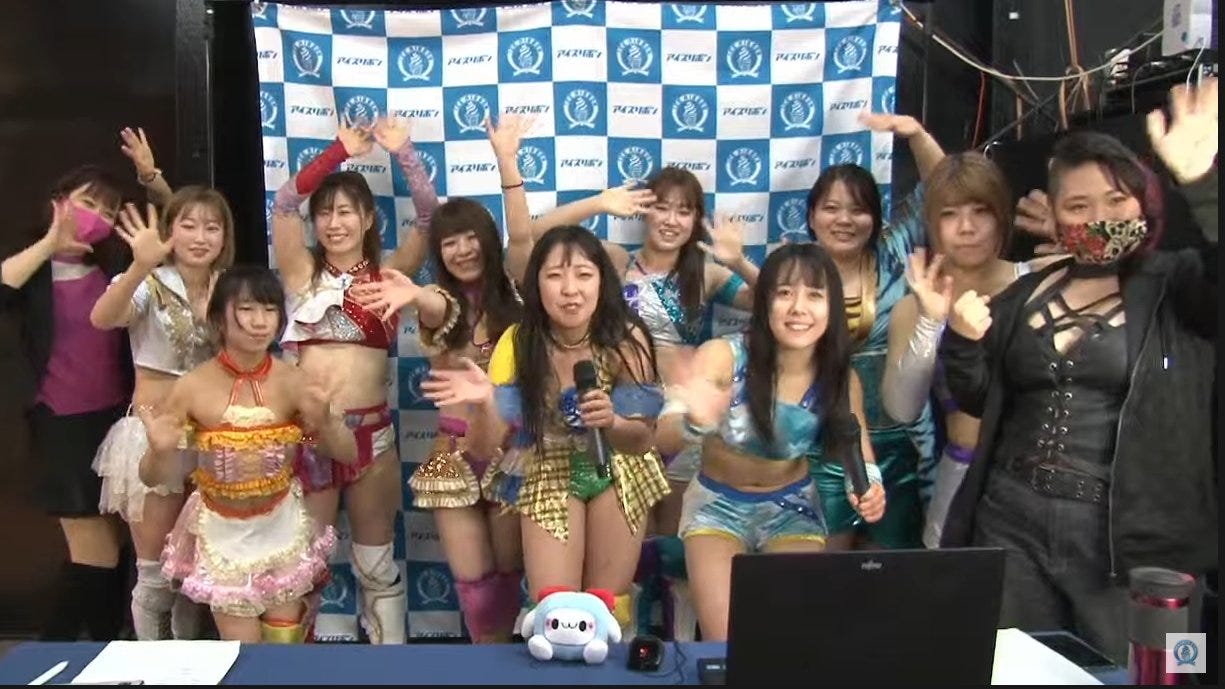Front Matter
Each image used in this newsletter is linked to the Twitter account responsible for it: simply click through to bring up the original post. If you are a photographer whose image I have used here, and you do not grant me permission to reproduce your work, please let me know (Twitter: @oystersearrings) and I will remove it. Thanks!
写真家さん、ここにイメージが写すことが許可しなければ聞いて下さって私は大至急除きます (ツイターの @oystersearrings です)。ありがとうございます!
Subscribe for free to receive Flupke’s Month in Wrestling every month in your inbox, or donate $5 a month to access the full archive. A portion of every subscription supports Amazon Frontlines, an organisation dedicated to working with Indigenous peoples to defend their way of life, the Amazon rainforest, and our climate future.
Tsukasa Fujimoto vs. Asahi vs. Ibuki Hoshi vs. Kaho Matsushita vs. Nao Ishikawa vs. Saran vs. Satsuki Totoro vs. Tsukushi Haruka vs. Yuuki Mashiro
30.03 / Ice Ribbon Club Ice Ribbon Match Vol.2 / Warabi Wrestle Butokan
I like to watch notoriously long arthouse films from time to time, not because I think it makes me look cool and clever (although it surely does), but because I enjoy seeing how directors tell stories outside the usual confines of a ninety minute runtime. This match, which is actually seventy-two matches in one, is about ten minutes longer than the second Kazuchika Okada-Kenny Omega IWGP Heavyweight title clash from 2017, the one that caused Dave Meltzer to break his star ratings scale for the second time in six months. But whereas that match offered a gigantised version of the standard NJPW main event psychology (and one which I’m fine admitting I was completely blown away by at the time), this was an entirely different proposition. This was a match designed to be as close to logical impossibilty as a match that actually happened can be: a seventy-two-minute sprint.
It’s not like we’ve never seen a match like this before, but they tend to arise in one context and one context only - retirement shows. Manami Toyota wrestled forty-nine opponents for a minute apiece for her retirement in November 2017, and Tequila Saya did more or less likewise two years later. Nobody retired at the end of this show, no individual had their career commemorated, but looking back we can maybe say that a certain idea of what Ice Ribbon has been as a promotion was given a final celebratory send-off by this match. You’d never have guessed it from the way she performed in her final few months, but Tsukushi Haruka is just over a month from retirement here, and Tsukasa Fujimoto is just over a month from indefinite hiatus. They’d both have their proper farewell matches at Yokohama Budokan in May, but nothing either of them did in those last few months came close to this for sheer, pure Ice Ribbon energy.
I’m not being obtuse here - to get to grips with what I mean when I say Ice Ribbon energy, all you need to do is watch the match (which I will keep referring to as a match, even though it’s seventy-two separate one-minute matches, because the action is unbroken from start to finish) . First of all, you’ll note that this is a no-audience dojo show, and that the nine performers seem to be doing this as much to amuse themselves and each other as any virtual audience. You might get the feeling of a training drill, like the ones we saw at the showcase event that Darejyo broadcast on YouTube later in the year - this is the space where these wrestlers practice and learn, and this match feels like a window onto that world.
Then the action begins, and Kaho Matsushita is immediately attempting a pin, not ten seconds into a match that promises to be longer than a Ric Flair-Ricky Steamboat broadway. It’s instantly clear that we can’t expect conventional psychology here - a minute just isn’t enough for anything other than pedal-to-the-metal urgency, assuming you’re actually trying to win, which everyone demonstrably is. Each of the nine wrestlers go through an eight-opponent gauntlet in turn, meaning that when it isn’t your turn to face eight rivals in quick succession you’re given plenty of cool-down time; as a result, almost every single one of this match’s seventy-two chapters is characterised by fast, scrappy, zero-bullshit offence. There’s some notable moments of variation on the formula, like Satsuki Totoro repeatedly teasing a flying crossbody to the outside, or Yuuki Mashiro bringing out the boxing gloves for a bit of comic relief, but these spots don’t so much create breathing room as add even more chaos into what is already a heady stew of screams and flailing limbs.
It’s all so consistently frantic that eventually you reach a zen-like state. The match establishes its own unique kind of rhythmic continuum, based on constant action. You couldn’t pull this off for this amount of time with any other format (Okada and Omega drew all the praise for their ability to go so fast for so long, but their matches always had a ton of slow build before the shit really hit the fan), and I’d go out on a limb and say that with this gauntlet-of-gauntlets stipulation, Ice Ribbon found the perfect match type to show off their vision of pro wrestling to its best effect. It’s the vision of wrestling that first appealed to me when I stumbled on a Hiragi Kurumi vs Kyuuri match on YouTube in 2017, the one that took my breath away when I first watched Tsukushi take on Mika Iida in that Catch the WAVE match that one fellow-traveller described as “pro wrestling as speed metal”. It’s small women going all-out, all the time; full speed, full volume, full commitment. Without the psychology you might want from a 5-star match, without the narrative accoutrements to appeal to a fan weaned on WWE, but with enough energy and full-throated passion to blow away even the sturdiest of cobwebs.
Indeed, it’s all so frantic that the result (Ibuki Hoshi picks up the most falls, and wins) gets buried in the never-ending action, even though everyone is fighting every moment like their life depended on it. I wrote yesterday about how Suzu Suzuki and Saya Kamitani’s match in this year’s 5 Star Grand Prix was a maximalist masterpiece, but this is maximalism of a different magnitude. Eventually the whole thing melts into a kind of wallpaper, and then suddenly you hear Yappy say “29th match”, and Asahi and Ibuki are scrapping for bragging rights ahead of their huge upcoming ICE x Infinity number one contendership contest, or Ibuki and Tsukushi are beating the shit out of each other with the kind of intensity you can only sustain for precisely one minute, or Asahi is pushing the referee away with the sole of her boot so that she can continue choking her best friend Kaho in the corner, and there’s a sense of unbound abundance, a runaway freight train, a set of performers all trying to one-up each others’ intensity levels in turn and thereby creating something that’s almost too much to hold in your brain in one go. It’s an experimental, boundary-pushing exercise, as many of the best Ice Ribbon matches have been (think Tsukka v Tin Tin, think Hot Dog Match), but it’s an intimate, grass-roots kind of experiment, one that relies quite simply on a set of performers executing their fundamentals to the best of their abilities, over and over again.
If there’s any sustained classical storytelling in this thing then it comes in the second-to-last gauntlet. Thirteen year old Saran, who’s only able to be here because her school is closed for Spring Break, is crying before the thing has even begun, and the stakes suddenly slide into blindingly clear focus - the baby of the roster is facing her biggest challenge to date, and everyone - fans and colleagues alike - needs her to get through this with pride intact. She almost succeeds in rolling up Nao Ishikawa with a dazzling corner move, to the applause of all her peers at ringside, and when Tsukushi enters the ring one match from the end Yappy is yelling “this is your future!”, and we’re not quite at the passing-of-the-torch stage, but we’re somewhere along that road. A little under ten minutes later, the marathon ends as it began, with Kaho taking on Tsukka, another proto-torch passing moment, another gesture towards the idea that the new generation, while not there yet, might one day be able to recreate the glories of the past five years. A readily-identifiable emotional hook emerges fully-formed out of the chaos. If there’s one thing that Ice Ribbon need more than anything else in 2023, it’s that.
Everyone knows the last year or so hasn't gone to plan for Ice Ribbon. A combination of wrestlers going freelance, retiring and taking time off to enjoy married life has stripped their main event scene to the bone, leaving them with a hell of a rebuilding job on their hands. It's a situation that was woven into the fibres of this match, as it took place not long before Tsukasa Fujimoto began her hiatus and Tsukushi Haruka retired. It made this gauntlet of gauntlets, in which everyone took turns to face everyone else in a series of one-minute bouts, feel like it was there to allow Tsukka and Skoosh one last chance to mess around with the rest of the roster.
And yet, intentionally or not, this chaotic clusterfuck of an idea was the thing that convinced me Ice Ribbon would be just fine. Yes, they're a company that has put on some mind-blowing matches in recent years (and most of the wrestlers responsible for those have now left), but that has always been secondary to Ice's willingness to give people the freedom to be themselves. Those incredible bouts came out of an environment that doesn't only nurture wrestling talent but allows their roster the time and space to experiment. That's why we've seen Tsukasa Fujimoto be ensnared in a love triangle with two pandas, watched the birth of deathmatch Suzu Suzuki and got to experience the unclassifiable genius of Miyako Matsumoto. Ice Ribbon gave them the basics before letting them loose to go their own way.
So, while this worked as a pure wrestling experience, with each one-minute chunk of action essentially being a mini-sprint, it made even more sense when viewed as a chance for these wrestlers to go out and show who they are. That format allowed Yuuki Mashiro to approach every segment in her own unique way, including pulling out some boxing gloves despite appearing to have no experience in that particular sport. But then, alongside that ridiculousness, we got wee Saran heroically battling to the end, despite being so exhausted by the time it got to her turn to run the gauntlet that she burst into tears before she'd even started. We even got a bit of random violence as Asahi decided she no longer fancied dealing with authority and actually quite enjoyed punching the ref in the head. The structure of the match meant everyone got their moment, and while Fujimoto and Tsukushi were their usual brilliant selves, even they struggled to stand out among their wildly creative underlings.
They knew it too, Tsukushi failing to fight back the tears in the aftermath as she expressed how happy she was to leave Ice Ribbon in good hands. Yes, there are still a lot of holes to fill, and Yuuki Mashiro will sadly also be hanging up her wrestling boots/boxing gloves at the end of the year, but that's just another bump in the road. As long as Ice Ribbon continue to give a home to the wonderful weirdos who step through their doors, I have no doubt that they will find their way.
- Stuart Iversen (@iversen83)
Previously: how Rakuism revitalised the Tokyo Joshi undercard
Next: An entirely unsurprising shout for Wrestler Of The Year







